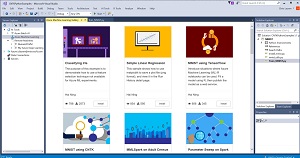News
Visual Studio Catching Up to VS Code Editor in AI Tooling
While the Visual Studio Code editor has featured artificial intelligence (AI) tooling for a while now, the Visual Studio IDE is catching up, recently getting its own AI extension.
Microsoft announced Visual Studio Tools for AI at this month's Connect(); conference, providing for the building, testing and deployment of deep learning solutions.
The new offering, available as an extension in the Visual Studio Marketplace, hooks in to the company's cloud-based Azure Machine Learning service to allow "robust experimentation." The company said that includes activities such as transparently submitting data preparation and model training jobs to separate compute targets.
Its functionality includes support for custom metrics and tracking run histories in order to facilitate data science reproducibility and auditing. It also reflects the company's increased focus on collaboration, letting developers securely work on projects with other people.
Microsoft said it works with deep learning frameworks such the company's own Microsoft Cognitive Toolkit (CNTK) or third-party offerings such as Google TensorFlow.
"Developers and data scientists can develop AI models with all the productivity of Visual Studio, on frameworks and languages," Microsoft said in an announcement from the Connect(); conference. "Updates to .NET make it easier for .NET developers to consume AI models from their applications."
While just becoming available to the Visual Studio IDE, a similar extension, Visual Studio Code Tools for AI, has been available for the open source, lightweight, cross-platform code editor since early September, debuting at the Ignite conference.
And VS Code still has other AI-related functionality not yet present in the IDE, such as an AI-driven Stack Overflow bot that answers developers' questions from within the editor.
 [Click on image for larger view.] Machine Learning Gallery (source: Microsoft).
[Click on image for larger view.] Machine Learning Gallery (source: Microsoft).
Visual Studio seems to be catching up, though, and the new offering was reviewed last week by Visual Studio Magazine's resident AI/data science expert, Dr. James McCaffrey, who works for Microsoft Research and writes our Data Science Lab articles, recently focusing on neural networking.
"It's a collection of behind-the-scenes utilities that can be added to the VS tool, to help you write machine learning programs," McCaffrey said in a blog post. "Put another way, VST_AI doesn't let you do anything new, instead, it's designed to make it easier to do things you can already do (in some cases, much, much easier)."
McCaffrey put the tool through its paces and concluded with a lukewarm summary: "Somewhat sadly, my main impression of the whole process was, 'Jeez, VS is becoming massively complex,' rather than, 'Wow, Visual Studio Tools for AI is cool.' There's always a tradeoff between using a bunch of tools that do just one or two things very well, or using just one meta tool like VS that can do dozens or hundreds of things. I generally prefer tools that are sort of in-between in complexity.
"Anyway, it's quite possible I'll grow to like VST_AI after I use it for a bit -- but it's also possible that I'll end up using an older development environment like the ones I use now. It's usually impossible to predict which developer tools will be a success and which will fade away. But I'm optimistic about VST_AI."
The extension has been downloaded more than 6,200 times as of this writing (climbing by the minute), receiving an average 3.0 rating (1-5 scale) from four reviewers.
The extension supports 64-bit Windows systems only (no 32-bit), with Windows 10 the recommended OS. It works with both VS 2017 and VS 2015 (separate packages), including the Community, Professional and Enterprise editions.
The source code for Visual Studio Tools for AI is available on GitHub (98 stars, three contributors), where developers can also find many links for resources such as: installation and preparation guidance; deep learning sample recipes; Quickstarts ranging from using TensorFlow + Python to creating AI projects from the samples gallery, existing code, a template or a samples repository; several tutorials; and more.
About the Author
David Ramel is an editor and writer at Converge 360.